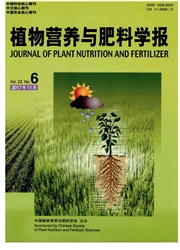

 中文摘要:
中文摘要:
以长期定位试验为平台,夏玉米品种郑单136为材料,设置CK(不施肥),NP(施氮、磷肥),NPK(施氮、磷、钾肥)和1.5MNPK(小麦季施高量氮、磷、钾肥+有机肥,玉米季仅施用化肥)4个处理,研究夏玉米钾素吸收规律及生育期内土壤钾素动态变化。结果表明,生育期内施钾与不施钾处理夏玉米干物质积累量均一直增加,在成熟期达到最大值;在施用氮、磷肥的基础上增施钾肥不但可以提高夏玉米地上部干物质积累量,同时也可以提高叶片及茎秆中的钾素含量,进而提高夏玉米整个地上部吸钾量;而在氮、磷、钾肥基础上增施有机肥,对夏玉米干物质积累无显著影响,但可显著提高茎秆及叶片的钾素含量和地上部钾素吸收总量。夏玉米钾素吸收主要集中在灌浆期之前,在灌浆期达到最大值,之后钾素出现回流现象。夏玉米收获后与播种前相比,土壤水溶性钾和交换性钾含量无明显下降或者略有增加,而非交换性钾明显下降,非交换性钾是夏玉米钾素吸收的主要形式。夏玉米吸钾量与播种前土壤3种形态的钾素含量呈显著正相关。因此,增施钾肥对于改善夏玉米生产,维持土壤钾素平衡及实现农业可持续发展具有深远意义。
 英文摘要:
英文摘要:
Long-term (over 20 years) fertilization experiments were conducted to study potassium (K) uptake of summer maize and potassium dynamics of fluvo-aquic soil in Zhengzhou of China. The study consisted of four treatments, CK (no fertilizer or manure), NP (nitrogen and phosphorus fertilizer applied), NPK (nitrogen, phosphorus and potassium fertilizer applied) and 1.5MNPK (nitrogen, phosphorus and potassium fertilizer and manure applied in winter wheat season, only chemical fertilizer applied in summer maize season). The results show that both in the treatments with K and without K, the dry matter accumulation amounts are constantly increased with maize growing, and the maximum values are at the maturity stage of summer maize. The K concentrations in leaves and stalks and K uptakes of summer maize are increased significantly by adding K fertilizer on the basis of applying nitrogen and phosphorus. However, by adding manure on the basis of applying nitrogen, phosphorus and potassium fertilizer (NPK), the dry matter accumulation of summer maize is not greatly affected, but the K concentrations in leaves and stalks and K uptake are increased significantly. The maximum K uptakes occur at the filling stage of summer maize in all the treatments and after that, backflow phenomenon is occurred. Compared with the soil K contents before maize seeding, the water soluble K and exchangeable K are declined or ascended slightly after the harvest, while the non-exchangeable K of fluvo-aquic soil is declined significantly. The non-exchangeable K is the main form for K uptake of maize. K uptake of summer maize has significant positive correlations with the three forms of K contents in the soil. Therefore, potassium fertilization is of far-reaching significance in improving the maize production, maintaining balance of soil potassium and realizing sustainable development of agriculture.
 同期刊论文项目
同期刊论文项目
 同项目期刊论文
同项目期刊论文
 Nitrous Oxide Emissions from Yellow Brown Soil as Effected by Incorporation of Crop Residues with Di
Nitrous Oxide Emissions from Yellow Brown Soil as Effected by Incorporation of Crop Residues with Di 期刊信息
期刊信息
